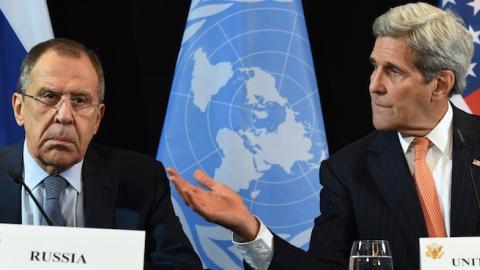No one really believes that the Syria truce scheduled to begin February 26—to bring a "cessation of hostilities" to the nearly five-year-old conflict—is going to hold. And nearly everyone, at home and abroad, agrees that the problem with the agreement John Kerry worked out with his Russian counterpart Sergey Lavrov is Russia.
If the ceasefire "hinges on Russia's good intentions," said British foreign secretary Philip Hammond, "it will fail before it gets off the ground." Democrats and Republicans voiced similar concerns last week when Kerry testified on Capitol Hill. If Russia violates the agreement, will the White House push back? Kerry said yes, but history is on the side of the skeptics. "Russia knows there will be no Plan B," said Sen. Bob Corker. "The only thing Russia has been consistent about is failing to keep its word," said Sen. John Barrasso.
Even administration officials are doubtful. Last week, the Wall Street Journal reported that Secretary of Defense Ashton Carter, chairman of the Joint Chiefs Gen. Joseph Dunford, and CIA director John Brennan don't believe that Russia is going to abide by the terms of the ceasefire. And there's good reason for skepticism: Russia, a central participant in the hostilities, wrote the rules to give itself plenty of flexibility. And what's worse, what American allies and especially American officials are loath to point out, is that the secretary of state is acting like Russia's defense lawyer. Whatever Moscow has in mind, Kerry is providing pre-emptive cover to justify it.
The truce stipulates that everyone put down their guns, but no one expects the Islamic State or Jabhat al-Nusra, the al Qaeda affiliate in Syria, to stop fighting. Hence, operations against these two groups will continue as usual. And, so it seems, will Russia's campaign against any other organization arrayed against Syrian dictator Bashar al-Assad, because this is what Moscow has done up until now. Indeed, the way Vladimir Putin sees it, any rebel unit he hits is by definition a terrorist group. When Russian planes hit hospitals and schools to terrorize civilians and send more rushing for the Turkish border, those aren't really hospitals and schools. According to Putin and his diplomats, those are terrorists. Given the cruelty and cynicism of the Russians, we can be fairly certain they will continue to bomb anyone they like, including civilians, during the "ceasefire."
Kerry doesn't think that's a problem, even if some of those rebel groups Putin has been hitting are backed by the CIA. If you don't put down your weapons, says Kerry, "if you don't choose to be part of [the agreement] then you are choosing to perhaps make yourself a target."
Okay, say that you're willing to abide by the truce, and you put down your arms, but the Russians bomb you anyway because Moscow sees the whole deal as an American invitation to shoot fish in a barrel—that is, to shoot the anti-Assad rebel units that Kerry disarmed with his bogus truce. Now, say you fight back against the Russians, or Assad, or the Iranians, or whoever else is shooting at you and your family. It's you who will be in violation of the agreement—not Russia. You can complain all you want, but good luck, because Russia not only wrote the rules, Russia is also the referee.
True, Washington and Moscow are co-chairs of the International Syrian Support Group "task force" established to implement the agreement and monitor compliance. But only Russia is on the ground in sufficient numbers to monitor and compel compliance. And in any case, the Obama administration isn't going to call out Putin for violating the agreement. That might make Moscow angry. And as John Kerry put it recently, "What do you want me to do? Go to war with Russia? Is that what you want?"
The secretary of state was speaking with Syrian opposition figures and aid workers. They petitioned him to stop siding with Russia and represent their interests, for once. "Don't blame me," said America's top diplomat. "Go and blame your opposition." Kerry will never forgive the Syrian opposition for not letting him surrender on their behalf to the forces that have slaughtered them for five years and who have no plans to stop now. The Russian-designed and White House-sponsored ceasefire is going to leave them defenseless.
The paradox at the heart of the truce is that it was supposed to facilitate humanitarian assistance. It was supposed to bring some relief to those whom Assad's forces, Hezbollah, Iran, and Russia have been killing. But it won't bring them relief; it will just make them more vulnerable by disarming the only people who are protecting them. The Syrian opposition knows this; so does the British foreign secretary and everyone on Capitol Hill, as well as the Pentagon and the CIA. On the other side, the Russians, Iranians, and Assad all know this, too. It's hard to know which would be worse—that the secretary of state and the president he answers to don't understand this or that they do.

















